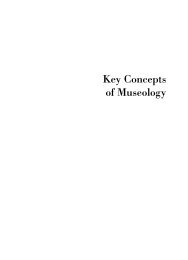ISS 25 (1995).pdf - The International Council of Museums
ISS 25 (1995).pdf - The International Council of Museums
ISS 25 (1995).pdf - The International Council of Museums
You also want an ePaper? Increase the reach of your titles
YUMPU automatically turns print PDFs into web optimized ePapers that Google loves.
· working over the community (or about the community)<br />
· working for the community<br />
· working with the community<br />
· let work the community<br />
<strong>The</strong> museologic approach towards the matter will depend <strong>of</strong> how clear these options may<br />
be. Clear options will prevent common mistakes such as - the apocaliptic conservacionism ; the<br />
cartesian approach to exhibitions; and the perception <strong>of</strong> the museological discourse as absolute<br />
thnuth .<br />
Museology, as any other science in the present days, works over relativization <strong>of</strong><br />
knowledge. <strong>The</strong> holistic approach, defended by contemporary Museology, does not accept the<br />
idea <strong>of</strong> museum as a ready-made product, nor <strong>of</strong> the community as an abstract social entity. <strong>The</strong><br />
museum is today understood as a phenomenon with all its dynamics and the community is<br />
perceived, in its broader sense, as a concrete representation <strong>of</strong> natural or social quanta.<br />
Everything, as we see , is relative. Community and Museum are relative concepts. <strong>The</strong><br />
world itself changes everyday - which means our perception <strong>of</strong> the world is also relative. Since<br />
nothing its absolute, what possible means do we have <strong>of</strong> making the museum promote knowledge?<br />
<strong>The</strong> first attitude is to promote the capacity <strong>of</strong> the museological community: it is<br />
fundamental that those who work with museums be prepared to make museology. On a second<br />
basis, it must be understood that the changing role <strong>of</strong> the museum does not apply to reality throuhg<br />
isolated activities, labelled as • educationar - which means that working with or for communities<br />
(specially in the social shpere) is an attitude <strong>of</strong> life, requiring a high degree <strong>of</strong> participation on all<br />
sides and where arrogance and prejudice are not welcome. Third - elements that will promote<br />
generation <strong>of</strong> knowledge must be searched in the communities themselves. <strong>The</strong>y may relate to the<br />
exchange <strong>of</strong> energies, to the understanding <strong>of</strong> the processes <strong>of</strong> life and nature ... or to the<br />
acceptance <strong>of</strong> the common knowledge <strong>of</strong> some communities (not the imposition <strong>of</strong> our own<br />
knowledge).<br />
It also refers to the recognition <strong>of</strong> museums and communities not previously<br />
imagined as such, in an attitude <strong>of</strong> nupture from traditional and old-fashioned pattems <strong>of</strong><br />
knowledge, towards new dimensions, new fonns <strong>of</strong> perception that until yesterday may have been<br />
called' non-scientific' or unorthodox. What better field <strong>of</strong> action than a sience under constnuction -<br />
such as Museology?<br />
98<br />
Rio de Janeiro, May <strong>1995</strong>.
















